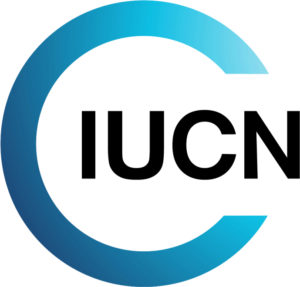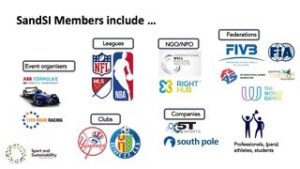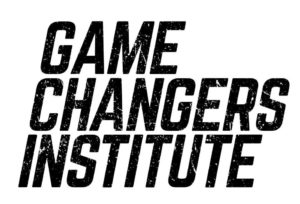
The Sustainability Report is an independent platform that provides economic, social and environmental intelligence for the sports industry. We showcase leadership, strategy, research and innovation through in-depth analysis, insightful podcasts, research-driven reports, and engaging animations. The Sustainability Report is published by Touchline, a multilingual international agency specialising in sustainability, sport and reporting














The International Union for Conservation of Nature (IUCN) is a membership Union uniquely composed of both government and civil society organisations. It provides public, private and non-governmental organisations with the knowledge and tools that enable human progress, economic development and nature conservation to take place together.
Created in 1948, IUCN is now the world’s largest and most diverse environmental network, harnessing the knowledge, resources and reach of more than 1,300 Member organisations and some 15,000 experts. It is a leading provider of conservation data, assessments and analysis. Its broad membership enables IUCN to fill the role of incubator and trusted repository of best practices, tools and international standards.
IUCN provides a neutral space in which diverse stakeholders including governments, NGOs, scientists, businesses, local communities, indigenous peoples organisations and others can work together to forge and implement solutions to environmental challenges and achieve sustainable development.
Working with many partners and supporters, IUCN implements a large and diverse portfolio of conservation projects worldwide. Combining the latest science with the traditional knowledge of local communities, these projects work to reverse habitat loss, restore ecosystems and improve people’s well-being.
What’s biodiversity?
Biological diversity, or biodiversity in short, is defined by the Convention on Biological Diversity as the ‘.. variability among living organisms from all sources including, inter alia, terrestrial, marine, and other aquatic ecosystems and the ecological complexes of which they are a part; this includes diversity within species, between species, and of ecosystems’. Biodiversity supports valuable ecosystem services that are essential for the survival and healthy functioning of human society and its economic activities.
The links between Sport and Biodiversity
Sport can have significant negative impacts on biodiversity, through the construction and use of sports venues and the staging of sporting events. Sport can negatively impact biodiversity through land use to build permanent or temporary sports venues and facilities, as well as through the pollution, noise, waste, lighting, traffic, and resource demand resulting from the staging of sporting events attended by hundreds or thousands of spectators. At the same time, sport, through its global reach, can be an important catalyst for raising awareness about the need for biodiversity conservation, and promoting and supporting efforts to enhance biodiversity.
Understanding and managing the potential negative impacts and opportunities for conservation is vital for ensuring that sports venues and sporting events deliver successfully both from the financial and operational standpoint. Unmanaged or poorly managed biodiversity impacts can lead to financial, regulatory, operational, and reputational risks. On the other hand, timely and effective action to mitigate risks and enhance conservation can help venues and event planners and organisers increase their social license to operate, more easily attract future sporting events, establish long-term positive relationships with communities and the media, and attract sponsors.
Mitigating negative impacts on biodiversity
The construction of new sports venues, the installation of temporary venues and associated facilities, and the use and refurbishment of existing venues can all impact on biodiversity. The type of risks and opportunities will vary, depending mainly on the location of the venue (i.e. whether it is sited in an urban area or in the natural environment, and the importance of that environment for biodiversity) and on its size. While the impacts may be broader, more severe, and more obvious in a natural, undeveloped area, where it is often necessary to construct access roads, power supply infrastructure, and water and sewer infrastructure (amongst others), there are also risks to developing in urban areas, where many species make their homes within the built environment.
The staging of sporting events in both urban and natural settings can impact biodiversity through the presence of large numbers of spectators, who increase noise, vibration, pollution, waste generation, and traffic. Other risks to biodiversity from sporting events include oil or fuel spills, sewage discharge, light pollution, increased use of chemicals and fertilisers, and increased demand for natural resources.
To address these potential impacts, developers should first comply with all legal and statutory requirements relating to biodiversity. Beyond compliance, the recommended way to manage biodiversity impacts effectively is through the mitigation hierarchy of avoidance, minimisation, restoration, and offsetting of residual impacts. Preventive mitigation measures (avoidance and minimisation) are always preferable to corrective measures (restoration and offsets).
Maximising opportunities for biodiversity conservation
Sporting events and their associated facilities can leverage opportunities to promote and support biodiversity conservation through a variety of activities and initiatives, including:
• enhancing natural habitats in urban environments by restoring degraded sites, connecting fragmented habitats, building ‘green’ rooftops and living walls, installing man-made habitats for wildlife, increasing the diversity of plant species, and incorporating plantings in their project design that provide additional habitat and benefits to local fauna and flora;
• increasing the area under protection through on-site or off-site protection of natural features;
• generating funds and increasing awareness for protected area management by staging low-impact sporting events, such as running or mountain biking, within or partially within protected areas;
• raising public awareness about biodiversity through the use of biodiversity elements as mascots or as part of an event’s logo, and the creation of public exhibits and educational programs, as well as through sports commentators and individual, high-profile athletes;
• increasing available knowledge and data by sharing biodiversity inventories and baseline information that may be required as part of venue development with conservation organisations and research institutions; and
• generating biodiversity benefits through projects designed to offset the carbon footprint of a venue or event.
Where can you find solutions?
IUCN, in collaboration with IOC, has developed a series of guides designed to help decision makers understand and manage these potential impacts, as well as for maximising opportunities to use sport as a way to promote and enhance biodiversity conservation.
Read more about the Guides: Sport and Biodiversity published by IUCN (International Union for Conservation of Nature) in 2018
- Sport and biodiversity in 2018
- Mitigating biodiversity impacts of new sports venues - published by IUCN (International Union for Conservation of Nature) in 2019
- Mitigating biodiversity impacts of sports events - published by IUCN (International Union for Conservation of Nature) in 2020






Sport and Sustainability International (SandSI) is a non-profit Swiss association that seeks to accelerate sustainability in and through sport. SandSI is a global membership organisation, bringing together both sport and non-sport entities as well as athletes and scholars from all continents, using one common language: sport. Through its programmes, SandSI strives to have a positive impact on climate, waste and health, aligning itself with the UN Sustainable Development Goals. The 2030 SandSI Goals are:
- Climate: the sport sector to become carbon neutral by 2030
- Waste: the sport sector to become zero waste by 2030
- Health: the sport sector to contribute to 15% reduction on physical inactivity by 2030
- 1. Football4Climate: a multi-year programme with and for the football industry to addresses its impact and leverages the cultural and market influence of football to promote climate action
- 2. SDG Sport Lab: a creative platform to initiate, encourage and support concrete initiatives that use sport to contribute to the United Nations Sustainable Development Goals



















he Youth Charter is a UK registered charity and UN accredited non-governmental organisation. Launched in 1993 as part of the Manchester 2000 Olympic Bid and the 2002 Commonwealth Games, the Youth Charter has Campaigned and Promoted the role and value of sport, art, culture and digital technology in the lives of disaffected young people from disadvantaged communities nationally and internationally. The Youth Charter has a proven track record in the creation and delivery of social and human development programmes with the overall aim of providing young people with an opportunity to develop in life.
Specifically, the Youth Charter tackles educational non-attainment, health inequality, anti-social behaviour and the negative effects of crime, drugs, gang related activity and racism by applying the ethics of sporting and artistic excellence. These can then be translated to provide social and economic benefits of citizenship, rights responsibilities, with improved education, health, social order, environment and college, university, employment and enterprise.
The Youth Charter acts as a social broker and cultural interface between public/private sector and donor organisations. The key to the Youth Charter approach is to provide capacity, leadership and self reliance to hard to reach young people and their communities. This is delivered through our Social Coach training and development workshops, programmes and projects. Further assistance, campaigning, advocacy, support and advice is delivered through our ‘on-line’ distance learning and evaluation tools, which provide a unique impact and assessment of each individual’s and community’s ongoing development and progress.
Supported by over 250 Global Sporting, Artistic and Cultural Ambassadors and high profile social role models, the Youth Charter is pioneering new approaches to tackling the increasingly serious problem of anti-social behaviour amongst socially excluded youth.

Since the public release of The Game Changers (TGC) in the fall of 2019, an estimated 75M people in more than 190 countries have viewed the documentary on various platforms, including iTunes, Netflix, and Youku.
In addition to TGC’s mainstream success, the film’s scientific credibility has resulted in recognition from the American College of Lifestyle Medicine, the Academy of Nutrition and Dietetics, and the Defense Health Agency, as well as an endorsement from the Special Operations Medical Association.
In response to the success of film and the support it generated, the Game Changers Institute (GCI) — an initiative of the Game Changers Foundation, a non-profit public charity based in the Unites States of America — was launched early 2021 in order to help unite the performance, health, social justice, and environmental spaces under a single authoritative banner with the integrity and diversity to reach a global audience about the critical importance of a plant-centered diet.


EduSport (Education through Sport) is a community driven NGO founded in 1999 in response to identified gaps in opportunities for communities to participate in sport and for youth empowerment.
Edusport’s aim is integrating Sport into the Development process through its programmes. It combines sports and life skills training especially to socio-economically under served and at risk young people.
Edusport is found in 9 of 10 provinces of Zambia. It is currently operating in over 84 under served communities in 21 districts around Zambia. The organisation targets youths, trains them to become peer leaders, local role models and community mobilizers to drive change and spread the message of hope.
Go Sisters! programme
Go Sisters! is a programme launched in 2001 in Lusaka, Zambia to empower girls through Sport concept. It’s meant to allow girls to play, learn, exercise leadership roles, develop, discus, and have that space which is usually taken away from them. The programme is run by Girls for girls with girls. They also try incorporate boys so a way of raising a generation that will appreciate and respect each other.


Founded by Matthew Spacie in 1999, Magic Bus equips children and young people in the age group of 12 to 18, with the skills and knowledge they need, to grow up and move out of poverty.
This takes them from a childhood full of challenges to a life with meaningful livelihoods. Since its inception, Magic Bus has transformed the lives of one million children and young people, helping them move out of poverty.
Magic Bus developed a life skills programme that aims to connect underserved children to vocations through sport.


United Through Sports is an alliance of many organisations working together through sports to bring unity and peace to an often-divided world. UTS is actively supported by the IOC, GAISF SportAccord and AIMS for the trust granted to us in coordinating this much needed initiative.
United Through Sports brought world renowned personnel to one round table in 2018 at the inauguration of UTS during the SportAccord Convention in Bangkok. The opening conference showed the importance of working together as one and the three day festival is an affirmation of our youth looking to us not only for guidance but reminding us all about our duties and the impact our decisions have on their future.


United Through Sport (UTS) is a UK registered development through sport charity helping disadvantaged communities reach their full potential in sport, education and health. We do this in Africa, South America and will be launching in Asia soon.
UTS are committed to using sport as a tool to develop disadvantaged and vulnerable youth by:
- Using direct sports coaching – for its health benefits, improved emotional well-being and increased life skills (teamwork, leadership, decision making, communication).
- Using sport to discuss critical issues – by delivering curriculums on topics such as HIV/AIDS awareness in a fun and interactive manner on the sports field.
- Using sport for improved education – by providing pathways to success for talented and dedicated individuals through scholarships to top local schools and tertiary education.
United Through Sport supports two core programmes, built up by a number of projects in each country they work in. The first is a Mass Participation Programme which gives thousands of disadvantaged kids the chance to play and enjoy the sports they love. The second is the Schools of Excellence (Junior and Senior) programme which provide top-level coaching and academic schooling for aspiring athletes.
United Through Sport is built on a clear pyramid structure. The Mass Participation Programme forms the bottom tier, the Schools of Excellence forms the second tier, and the careers in sport forms the top tier. All their work, donations and volunteering go into supporting this pyramid structure.


The Active Well-being Initiative is a non-governmental organisation founded in 2017 who promotes physical activity, Sport for All, sustainable health and well-being.
The AWI is a unique platform designed to create and encourage international cooperation opportunities, integration and implementation strategies, established programmes and institutional models. The AWI hosts, manages, and promotes federative reference frameworks and recognition schemes in the field of well-being and sustainable health. The AWI enables cities to enhance the well-being of their population, while receiving international recognition for their progress through a certification process. Citizens are empowered and engaged in order to adopt a more active and healthy lifestyle.
AWIs' approach and methodology is based on international standards and tools, and supported by a network of field experts. As an initial step in 2017, the AWI launched its first label, Global Active City, leveraging on physical activity and sports to enhance individual and collective well-being.
Moving forward, the AWI and its partners continue to develop a more holistic approach which encompasses more dimensions and drivers of well-being, such as healthy nutrition, mental well-being, personal coaching, culture and art.
Through the AWI model and suites of tools and services, cities are encouraged to move further away from the current, largely pathogenic paradigm to adopt a new approach based on the promotion of active and healthy lifestyles and environments. They may start their journey by joining the AWI as a Partner City and adopting the Global Active City framework, implementing the corresponding management system, establishing a strong alliance and a number of new initiatives, defining clear roles and responsibilities to ultimately achieve the proposed internationally-recognised certification. Alternatively, and in the near future, cities may also decide to adopt a more rounded and multidimensional approach to well-being and follow the model proposed by the Global Well-being City label. In addition, such a model will also be proposed to organisations (private, public, for profit, NGOs, of all sizes and nature) which decide to adopt a more proactive, healthy and active workplace approach for their staff, members, participants, visitors or customers.
